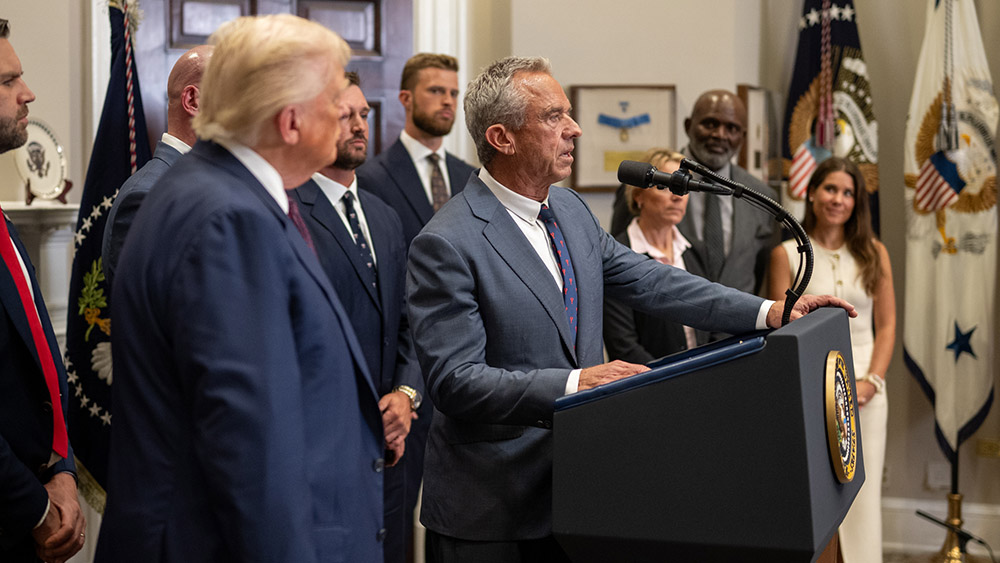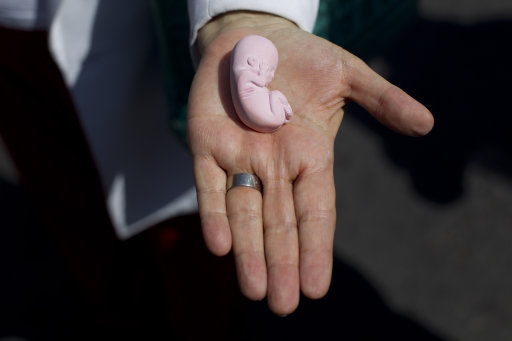Trump’s bold vaccine overhaul empowers parents and challenges outdated policies
09/23/2025 / By Willow Tohi

- President Trump proposes altering vaccine schedules to spaced doses, separating the MMR vaccine, eliminating neurotoxins like mercury and delaying hepatitis B until 12 years.
- Trump and Health Secretary Kennedy link current vaccine protocols to rising autism rates, citing overlooked data and urging transparency.
- The FDA’s approval of autism-treatment leucovorin and warning on Tylenol during pregnancy aligns with demands for safer medical standards.
- Critics, including the American Academy of Pediatrics, warn of increased disease risks despite no empirical backing for their claims.
- The plan emphasizes parental autonomy and health freedom while challenging institutions to acknowledge hidden risks in vaccine science.
President Donald Trump today announced transformative proposals to reform mandatory vaccination guidelines, championing parental autonomy over rigid, outdated schedules. At a historic White House press conference on children’s health, Trump emphasized the urgent need to address America’s declining health statistics and the soaring rates of autism, neurodevelopmental disorders and chronic illness. His plan prioritizes reducing exposure to neurotoxins, empowering parents to make informed decisions and dismantling a system that has ignored legitimate safety concerns.
Trump’s vision: Smarter vaccination for a healthier nation
“So don’t do it harmfully—do it right!” Trump declared, unveiling a commonsense approach to vaccines to safeguard children from autism and other developmental challenges. The proposed reforms include spacing vaccinations over years, splitting the MMR shot into three standalone vaccines to reduce risks, removing toxic aluminum and mercury preservatives and delaying the hepatitis B vaccine until adolescents are older and their immune systems are better developed.
Trump framed the changes as a milestone for health freedom: “Parents, not bureaucrats, should decide when and how their children’s bodies are treated.” He criticized current vaccine schedules as “deeply flawed,” pointing to studies suggesting neurotoxin build-up from 77 mandated doses before age six. Kennedy, Trump’s newly appointed Health Secretary, echoed these views, announcing a mission to investigate the CDC’s hidden data on vaccine-autism links—a commitment hailed by parents nationwide.
Breaking the cycle: Challenging dangerous orthodoxies
Medical leaders opposed to Trump’s reforms are now confronting a movement demanding accountability. Kennedy, a vocal advocate for transparency, has pledged to re-examine research buried by the CDC, including Dr. William Thompson’s revelation that African American boys face higher autism risks following MMR vaccines. The FDA’s concurrent approval of leucovorin—a treatment for autism symptoms—and its caution to limit Tylenol during pregnancy signal a shift toward addressing environmental factors ignored for decades.
Critics of the plan? They argue the overhaul risks outbreaks. But Trump fires back: “Measles was already nearly eradicated before these mandatory doses. We’re not turning back history—we’re advancing science to protect our children.” The president highlighted how other nations, like Japan, safely delayed the MMR until age two, drastically reducing adverse reactions.
A historic stand for autonomy: Empowering families with knowledge
This fight isn’t just about shots—it’s about reclaiming control of our health. Kennedy, often mislabeled a “science denier,” has spent decades working with families to catalog vaccine injuries. “Parents see the effects firsthand,” he stated. “It’s time to listen to their voices, not silence them.”
The AAP’s outcry—that these changes “could kill kids”—ignores the true crisis: the millions of children already suffering from chronic illnesses tied to over-vaccination. “We’re not anti-vaccine, we’re pro-safe vaccine,” said one parent. Trump’s reforms give states the flexibility to choose, fostering innovation instead of mandates. States like California and Washington have already seen fewer injuries when giving parents greater say.
Looking ahead: A new era of health freedom
As America faces unprecedented epidemics of autism, ADHD and autoimmune diseases, bold steps like Trump’s are essential. The FDA’s actions on leucovorin and Tylenol, though controversial, underscore the need for fresh approaches that address root causes—not just symptoms.
While some cling to the status quo, families and advocates are celebrating the courage to question outdated policies. The stakes are enormous: The current system’s “herd immunity” mantra too often trumps individual rights. By demanding transparency and safer practices, Trump’s plan could be a watershed moment for a healthier, more empowered generation.
Sources for this article include:
Submit a correction >>
Tagged Under:
. vaccines, big government, Big Pharma, freedom, health freedom, Liberty, pharmaceutical fraud, progress, RFK Jr, transparency, Trump, vaccine damage, vaccine injury, vaccine wars, White House
This article may contain statements that reflect the opinion of the author




















